Atlantic Monthly Contributors's Blog, page 1122
March 13, 2013
After Catholicism Reached South America, It Took 520 Years for a South American to Reach the Papacy
Today's election of Cardinal Jorge Mario Bergoglio to the papacy is notable for two big reasons: he's the first non-European, and the first ordained member of the Society of Jesus, to occupy the highest seat of the Roman Catholic Church, both of which upend millennia of precedent. While the fact that Bergoglio is a Jesuit is, in itself, a pretty huge deal — the order has long stood at the periphery of the Catholic Church's hierarchy — his being born in Argentina is a far greater one. While Catholicism has claimed South America to be under its domain officially since 1493, no South American has ascended to the papacy before today.
1493 was the year that Spanish explorer Christopher Columbus reached the continent on a Church-endorsed exploration of the New World. As the Catholic World noted in 1893, "Where American civilization was first planted by Columbus, in 1493, the Catholic Church reared its first altar on this soil four hundred years ago. ... Christianity and civilization were born in the same cradle and at the same moment, in the western hemisphere." A papal bull inssued in May of that year by Pope Alexander VI commanded: "Among other works well pleasing to the Divine Majesty and cherished of our heart, this assuredly ranks highest, that in our times especially the Catholic faith and the Christian religion be exalted and be everywhere increased and spread, that the health of souls be cared for and that barbarous nations be overthrown and brought to the faith itself."
An eventual member of the sprawling Spanish Empire, Pope Francis' native Argentina gained independence from Spain in 1810, but remained largely Catholic. As pointed out by many today, the majority of Argentinians continue to identify as Catholic, however only 20 percent identify as practicing.






Nope, Obama Didn't Share Keystone Decision with House Republicans
The president of the United States chose not to reveal how he planned to decide on a highly controversial issue to a group of political opponents. This is only news because of what you may have read earlier.
For the past five years, TransCanada has been pushing the government for approval of the Keystone XL pipeline, a large shunt that would move semi-processed fuel from tar sands deposits in Alberta to the Gulf Coast by way of the rest of America. Because the pipeline would cross the border, it requires permit approval from the State Department.
Green activists quickly seized on that permit — and the Democratic president who would ultimately have to approve it — as an opportunity for political leverage, turning the Keystone XL permit into a key environmental indicator. They began an active campaign in opposition, circling the White House with protestors and committing acts of civil disobedience. Last year, as Obama worked to solidify support before his reelection, he postponed a decision on the permit. Environmentalists claimed temporary victory — knowing that the issue would come up again.
As it has. The debate over the Keystone XL pipeline now ranks with gun control and the details of the federal budget as one of the most contentious issues in Washington. Opponents and supporters are deep within a communications war, analyzing every statement from the White House for any clue on Obama's intent — while simultaneously throwing out plenty of statements of their own.
Which made this BuzzFeed headline on Wednesday afternoon, following a meeting the president held with Republican leaders, particularly surprising:

This got a lot of reporters attention because, if true, it would have been a pretty big news break. The article read:
President Barack Obama indicated during his lunch Wednesday afternoon with House Republicans that he would approve the Keystone pipeline, Rep. John Carter told reporters
Obama previously blocked the completion of the pipeline, citing environmental concerns. But Carter and other Republicans present at the meeting said they were told the White House would drop its objection.
That article didn't last long before it was redacted (but not formally corrected):

Obama has blocked the completion of the Keystone pipeline, citing environmental concerns, but Rep. John Carter emerged from their lunch said the president indicated he would drop his objection.
The White House moved quickly to reject the notion that the president said anything definitive during the meeting after BuzzFeed first reported Carter's assertion.
Now, it's not clear who made the error here: Carter or BuzzFeed. The BuzzFeed report did not quote Carter at all, so there's a possibility he mischaracterized Obama's remarks. But one CNN reporter suggested that Carter said Obama had "indicated" he would approve the pipeline but stopped short of saying he had. (Staff for Carter were unable to confirm the content of his remarks.) When BuzzFeed got additional comment from other Congressmembers who were present, it became clear that someone's interpretation was wrong.
Obama's original objection actually focused on the rushed timeline for approval imposed by House Republicans in 2011. The group has been champing at the bit for the permit; Rep. Paul Ryan's budget proposal, announced yesterday, includes approval of the pipeline.
It should go without saying, but of course the president wouldn't tip his hand on any decision in that venue, to that group, at this time. Obama is as aware of the potential political leverage from the decision as anyone. Politics is generally a transactional process: deals are negotiated and compromises reached with various carrots and sticks and, occasionally, pipelines.
The politics of the pipeline are simple. Republicans use a delay in approval as a cudgel to suggest that the president doesn't care about jobs, or is against fossil fuel development, or both. Environmentalists see it as a litmus test for the president's commitment to combatting climate change. Which means that the president could use approval or rejection of the permit to make a deal with either group. Allow Keystone as part of a budget package with Republican leaders, for example, or get greens and their Congressional allies to acquiesce to a slower roll-out of carbon emissions rules in exchange for killing the pipeline. That sort of thing.
What makes no sense is giving up his hand unilaterally. It makes no sense that he would say, "here's what I'm doing" before he tries to see what he might get. It makes no sense that he would say that to junior members instead of leadership. And it makes the least sense of all that he would answer one of the preeminent questions of his presidency over an informal conversation among opponents.
That's one reason the original story made no sense at the outset. Here's another. It's possible that the president has already made up his mind on the pipeline. The first people to know whether or not he has will likely be the group with whom he's trying to make a deal. And when news of his decision finally breaks — rest assured, you'll hear it from the White House first.






A Strange Day to Be Named Francis Pope
As Cardinal Jorge Bergoglio emerged Wednesday at a joyous Vatican and took the papal name Francis, there was no joy on Facebook for guys with the name Francis Pope—or Frank Pope, for that matter. Of course, at least one Franklin "Frank" Pope we found, a 32-year-old Lutheran from Chicago, is used to the ribbing by now. Frank, one of many Popes whose Timelines are beginning to grow holy seeds of bad jokes, runs what he describes as a skateboard contracting company. And his friends on Facebook were the first to connect him to the new head of the Catholic Church:
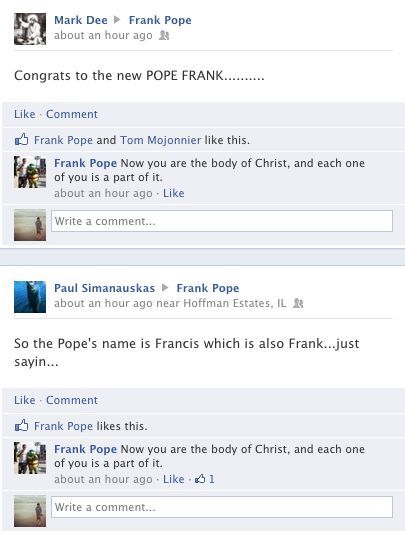
And then Frank retaliated:
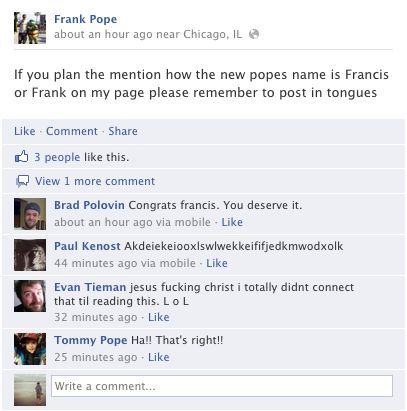
Reached by phone shortly thereafter, Pope, who seemed rather unfazed by the new papal connection to his name, explained to The Atlantic Wire that he just "made a cheesy joke." Pope jokes, it seems, are old news to people with the name Pope. "When your last name's Pope your whole life you get it," he said. His father's name was the more 


Anti-Sodomy Law Erased in Virginia, but Not in 13 Other States
Ten years after the Supreme Court ruled laws could not prohibit sex between consenting adults, it was still illegal for two consenting adults to engage in sodomy in Virginia—until Tuesday. It took a split decision from a federal appeals court on a gruesome case, but sodomy is finally legal in Virginia, even if holdouts remain in other states where local laws still take what's seen as an anti-gay stance to the highest court's ruling.
A three judge panel on the U.S. Court of Appeals for the Fourth Circuit ruled 2-1 that Virginia's "Crimes Against Nature" anti-sodomy provision, which prohibited anal and oral sex, is unconstitutional. Therefore, the provision has been invalidated. The Supreme Court ruled in the landmark 2003 decision Lawrence vs. Texas any state laws that criminalized sex between two consenting adults were to be invalidated. Apparently Virginia—and 14 other states with anti-sodomy laws on the books—never got that message. But the decision by the appeals court today was praised by groups like the American Civil Liberties Union's Virginia chapter because the law was seen as infringing on the rights of LGBT Virginians. (There remain those other 13 states, including Montana, Kansas, Oklahoma, and Texas, where you're only prohibited from having anal sex if you're gay.)
So while the ruling was seen a civil-rights victory, the case that brought it to the forefront was less than an ideal precedent setter. In 2005, 47-year-old William Scott MacDonald was convicted of trying to solicit a 17-year-old girl for anal sex. She refused and reported him the police. He was charged with a felony according to provisions in the state's Crimes Against Nature law. A state court had previously ruled that Lawrence vs. Texas didn't apply to MacDonald's case, and that he should still be found guilty, because he tried to solicit sex from a minor, which the Supreme Court decision doesn't directly mention. So MacDonald took his case to the federal appeals court, which ruled in his favor, because the Supreme Court law invalidates any and all laws prohibiting sex between two consenting adults.
The inherent grossness of the human-rights victory was not lost on ACLU representative Rebecca Glenberg. She urged the state to adopt clear laws that prohibit any sex between an adult and a minor. "Instead, the legislature should enact narrowly drawn statutes that do not apply to private conduct between consenting adults and define equitably and clearly what sexual conduct with minors is unlawful," she said.
[Note: the image above is from a 2003 protest supporting the Supreme Court's decision.]






America's 3 Biggest Cybersecurity Vulnerabilities
When James Clapper, the country's top intelligence official, visited Capitol Hill this week to discuss the major threats facing America, he put cyberattacks at the top of the list.
The lengthy discussion of cybersecurity marked a change from testimony Clapper gave in 2012 and 2011. In his annual assessments of worldwide risks in the two previous years, digital threats were mentioned only briefly and were further down on the list of dangers. Cybersecurity is a top priority this year for President Obama, who was planning a meeting Wednesday in the White House Situation Room with business executives to discuss the issue. Concerns are growing about a potential attack that could cripple the nation's infrastructure.
Clapper, the director of national intelligence, told a Senate panel that it would be "hard to overemphasize" the significance of the threat. Here are the three areas where the country is most vulnerable to a cyberattack:
Electrical Grid MORE FROM NATIONAL JOURNAL Pope Advice from America's Political Consultants Watch a Mesmerizing Real-Time Map of Cyberattacks Obama Just Wasted a Big Chance to Sell His Economic VisionSeveral of the nation’s critical infrastructure networks are poorly protected, including parts of the power grid. A cyberattack could lead to regional power outages, Clapper warned. He said that a "less advanced but highly motivated" actor could access poorly protected American networks that control power servers, which experts warn are vulnerable to Web-based attacks.
“The problem with the power sector is that there’s an assumption that a lot of these things are not connected to the Internet, but it turns out that they are,” said Adam Segal, a senior fellow at the Council on Foreign Relations.
Many pieces of the electrical grid are old, and some are 10 to 20 years out of date. At many plants, there are no immediate plans to upgrade the equipment to counter cyberthreats, Segal said.
Financial InstitutionsIn the last six months, there have been 140 cyberattacks on Wall Street, Gen. Keith Alexander, the head of the U.S. Cyber Command at the Pentagon, told a House Armed Services Committee hearing Tuesday. Administration officials said that Iran last year attacked five leading U.S. banks around the same time it disabled 30,000 computers at a Saudi Arabian oil company.
“They have toyed at the edges of being active here,” said James Lewis, a senior fellow at the Center for Strategic and International Studies. “It wasn’t a fluke; it was a test.”
Lewis warned that Iran is capable of carrying out a larger-scale cyberattack on the United States and financial institutions could become a target because of the tensions between the two countries.
Business leaders have been open with the federal government when they get attacked. But that doesn't mean they have been open to changing their practices or letting the government regular their digital security. Part of Obama's recent outreach to the business community involves making sure that financial institutions and other businesses are well-protected.
Government ServicesIn the last several years, the federal government has boosted the security for several of its servers, including for .mil and .gov. But experts said state and local governments lack the resources, and in many cases an awareness of the threats, to undertake the same efforts. An attack on a municipal government’s Web server could disrupt utilities and put public safety at risk. Local fire departments, water companies, and traffic lights all rely heavily on the Internet.
“If you wanted to cause disruption, this would be a good target,” Lewis said. “It depends on what your goal is. If you want Americans to run around in circles and wave their arms, governments are good targets.”
The Senate last year made progress on a broad cybersecurity bill but it ultimately collapsed. Alexander and other administration officials want to see Congress pass comprehensive legislation this year, but the general said a worst-case scenario would be if Congress were to have to pass something in haste after a cyberattack has already occurred.






March 12, 2013
Babies Are Evil, Just Like Us
Discovered: Babies are very calculating; political turmoil affects HIV treatment; another Earth is out there, probably; gender stereotypes affect the advancement of women in science.
Babies like people who injure babies not like them. It's no secret that infants like people who are nice to them — usually their parents, and maybe their playmates, too. But according to several American researchers, babies also like people who harm or otherwise injure babies who are somehow unlike them — i.e., babies who like different kinds of food than they do. To be sure, such behavior is found among adults — the enemy of your enemy is your friend, and all that. But who knew that babies were so calculating, too? As one of the researchers in a new study explained, "The fact that infants show these social biases before they can even speak suggests that the biases aren’t solely the result of experiencing a divided social world, but are based in part on basic aspects of human social evaluation." [Psychological Science]
Political turmoil affects HIV treatment. Treating HIV in the developing world is difficult for a lot of reasons — a lack of access to contraception among them — but rarely is the political climate figured into treatment research. But scientists at Brown University now insist that political strife can attenuate the efficacy of HIV treatment: "When violence erupts, staying on ... delicately balanced medications can become impossible. Drugs may no longer get to the clinic, patients and health care workers can become displaced, travel to the clinic can become unsafe, and patients can become profoundly depressed by the horror and tragedy around them." All the more reason to avoid violence whenever possible: "If political leaders and their opponents happen to need one more reason to forgo violence, they can consider how it appears to worsen the HIV pandemic among their constituents." [AIDS Reviews]
Another Earth is out there, probably. We know that there exist other planets which, like Planet Earth, are capable of supporting life. But until now we weren't quite sure how many of them there were in the universe. Just within ten light years, a Penn State geoscientist says, there "about four" Earth-sized planets in the habitable zones — "a region around a star where rocky planets are capable of sustaining liquid water and therefore life" — of the 10 nearest small stars. The geoscientist went straight to the point in explaining the application of his research: "There are nearly three times as many Earth-sized planets in the habitable zones around these low mass stars as in previous estimates [which] means Earth-sized planets are more common than we thought, and that is a good sign for detecting extraterrestrial life." [Astrophysical Journal Letters]
Gender stereotypes affect advancement of women in science. We like to think of science as coolly rational, unaffected by cognitive shortcuts like stereotypes. But according to three American researchers, women with careers in commercial science are often impeded by stereotypes about their gender. "Female professors are almost 50 percent less likely than their male counterparts to be invited to join corporate scientific advisory boards (SABs) and start new companies mainly because of gender stereotyping," their study found, citing belief that "women lack leadership and business savvy" and that women "are not capable of helping new ventures attract investment." Academia, they argue, can help level the field: "University scientists have helped create at least half of the publicly traded biotech firms operating today, and a female professor is most likely to draw a science advisory board invitation by tapping into her school's technology transfer office." [Academy of Management Journal]






Charts of Fiscal Doom: A Pre-Paul Ryan History
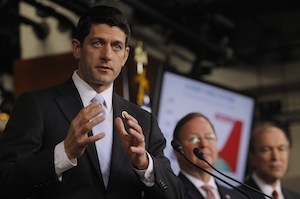 Paul Ryan is Washington's top chart man, and, as expected, was flanked by a chart when he presented the House Republican budget Tuesday. But terrifying charts of impending fiscal fears — and in bright blocks of color — are not a new thing. It's not even a computer-age thing. There have been charts of calamity forever. Here are some of the classics.
Paul Ryan is Washington's top chart man, and, as expected, was flanked by a chart when he presented the House Republican budget Tuesday. But terrifying charts of impending fiscal fears — and in bright blocks of color — are not a new thing. It's not even a computer-age thing. There have been charts of calamity forever. Here are some of the classics.
Granted, this chart is a little different than Ryan's. While Ryan's plan balances the budget in 10 years by severely cutting Medicaid, cutting Pell grants, and eliminating Obamacare, the chart below was Henry Wallace's "budget for abundance" when he was running for president in 1948 on the Progressive Party ticket. Wallace wanted less defense spending and more public welfare spending.

President Harry Truman explains the budget to reporters in 1951.
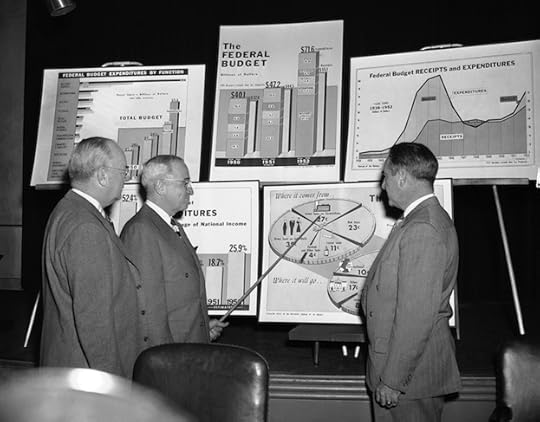
The 1950s-ish figures look cool.
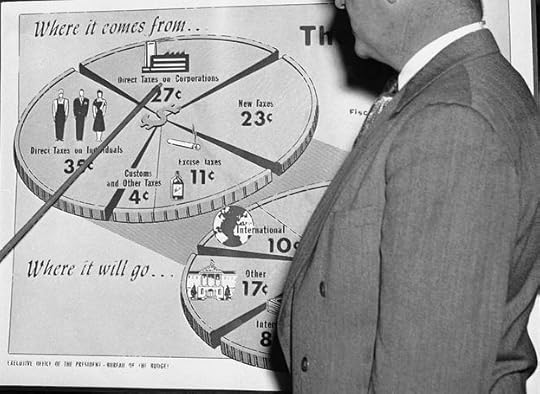
We have been trying to cut Department of Defense spending for a very long time. In 1965, Defense Secretary Robert McNamara shows how the Pentagon saved $2.5 billion the year before by "buying only what we need" and "buying at the lowest sound price."
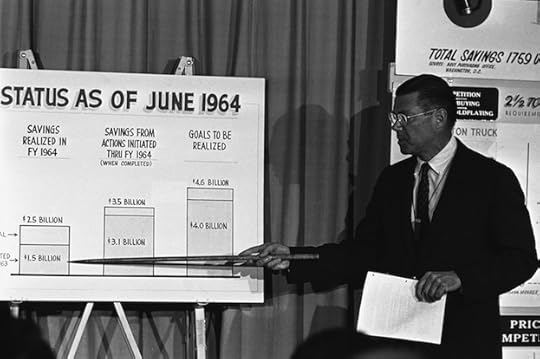
There is always pushback from defense hawks, however. Here then-Rep Gerald Ford shows there's a merchant ship shortage hurting the Vietnam war effort in 1965.
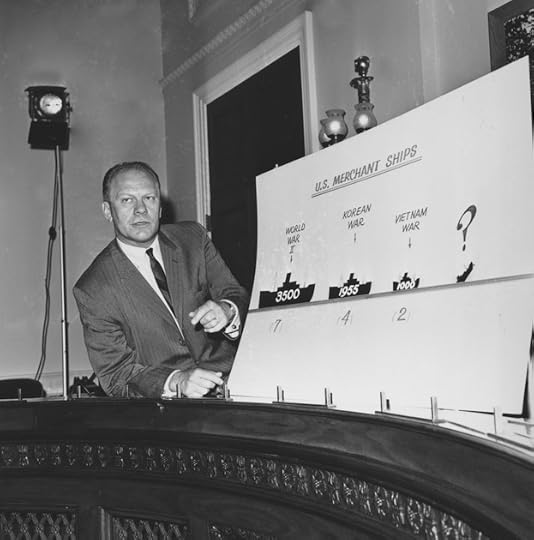
McNamara back with a sea of spending-cutting charts in 1965.
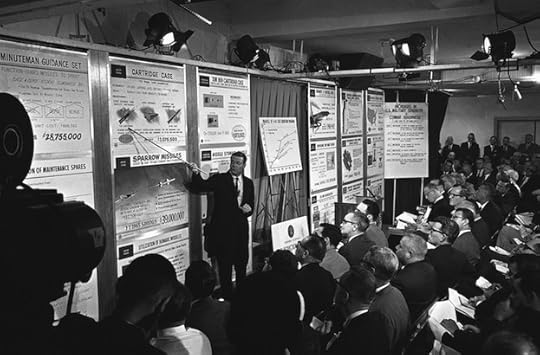
In 1971, Sen. Ted Kennedy showed some familiar-looking charts on the driver of our deficit spending, health care.
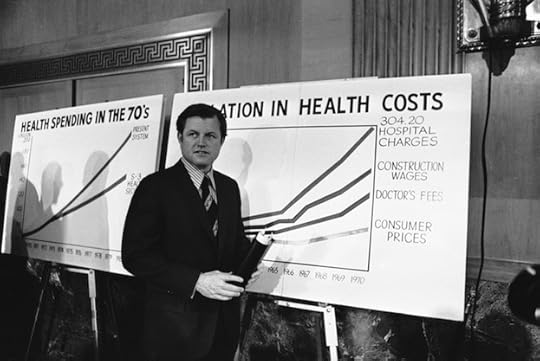
In 1984, Walter Mondale attacked Ronald Reagan for his deficit spending, showing each family's share of the deficit. Sound familiar? Politicians still use that trick.
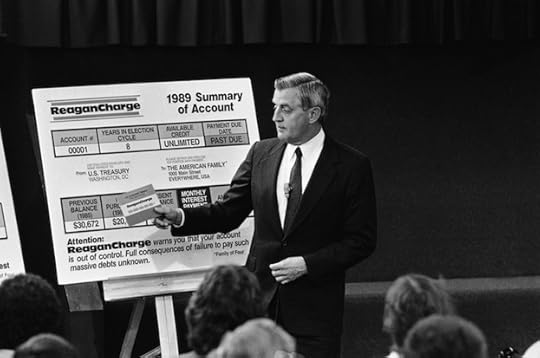
Sometimes images are more powerful than lines. Then-Rep. Barbara Boxer showed excessive spending by holding up a sketch of a 10-cup coffee pot that the government paid $7,000 for.

Ross Perot aired 30-minute commercials on the deficit in October 1992.
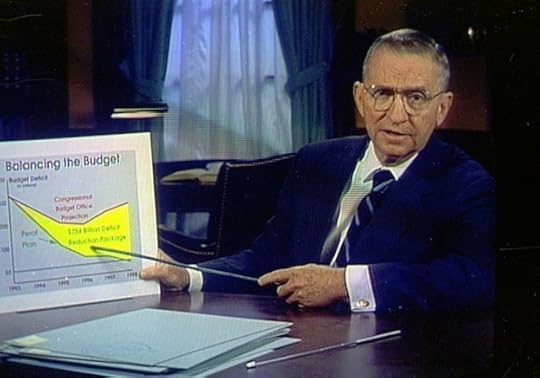
In 1995, President Bill Clinton showed the budget deficit could actually go down.
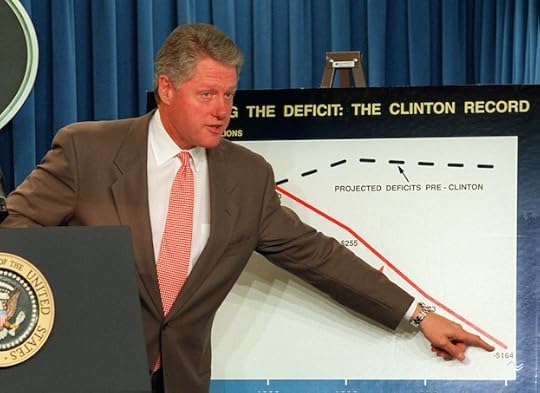
In 1999, a simple chart.
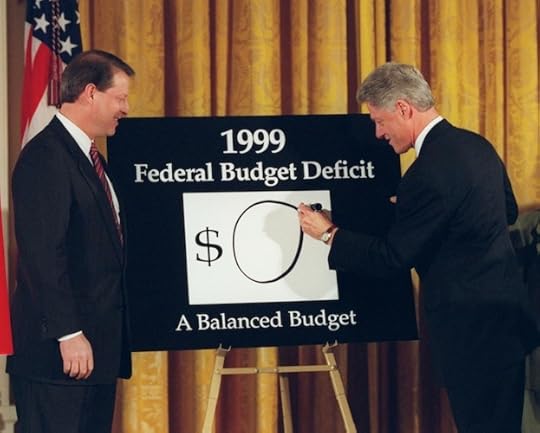
Sen. Kent Conrad gave George W. Bush a gold medal in deficit spending.
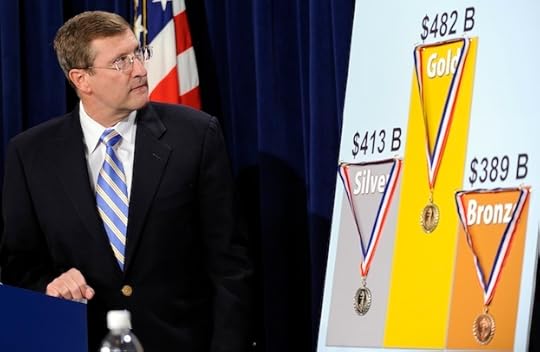
Paul Ryan doing his chart thing in 2011.
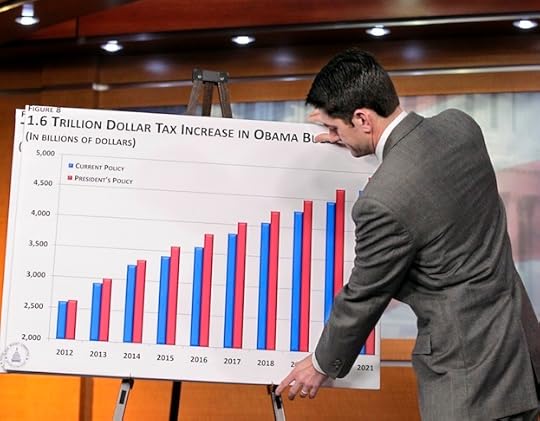






Sarah Palin's Holiday Nightmare Will Be a Christmas Classic
Though she was supposed to be president by now, two-year governor of Alaska Sarah Palin will have to settle for writing books that likely millions of people will buy. Her next one will be a holiday book called A Happy Holiday IS a Merry Christmas, which is about the "over-commercialism" and "homogenization" of the Christmas holiday. Y'see, as Palin explains it, the book "will encourage all to see what is possible when we unite in defense of our faith and ignore the politically correct Scrooges who would rather take Christ out of Christmas." Aha. What Sarah is saying here is that because some people say that we should include all winter holidays when we say things like "the holidays" and "Happy Holidays," we are taking the Christ out of Christmas. Also by making secular Christmas movies about Santa Claus and Will Ferrell elves and whatever else, we are forgetting the true meaning of the holiday, which of course is a reappropriated Roman solstice celebration. So that's what Palin wants to get back to, I think. And she's right, too. Christmas is a dying holiday in this country, as radio stations devote themselves to nothing but Hanukkah songs for the month of December and every TV show has a special Saturnalia-themed episode. It's a scary, scary thing. The book will feature her arguments on this matter, plus stories from Palin's own family Christmases, which of course are usually spent bathed in a wolf's blood, examining its organs to divine information about the coming year. Can't wait to read all about it! [The Hollywood Reporter]
While on the topic of very particular and accurate religious texts, The History Channel's dramatic miniseries The Bible scored high ratings in its second week, airing to 10.8 million people on Sunday. That's down 18 percent down from its first week, but that was probably to be expected. Some people were just tuning in for the dinosaurs, and that part's over now. Plus Sunday night's episode was just a bunch of Old Testament stuff, like Samson and Delilah and King David and all that. Next week is when Jesus shows up, so things are really going to get good. Dany will still be across the Narrow Sea with her dragons and Sirius is still in Azkaban, but at least Jesus is around to help save Middle Earth. Should be exciting! [Entertainment Weekly]
Speaking of enchanting stories, actor Bendlybitch Cummerbunds has confirmed that not only is the third season of his BBC show Sherlock currently in production, but that there are plans for a fourth season as well. Oh how exciting! Everyone loves Sherlock. Martin Freeman is great as Watson, of course, but really it's all about Bindlysticks Cubberthatch as Holmes. He's very good, that Bandikit Crumblybum. [The Hollywood Reporter]
Cumberbatch's (no, that's not right...) costar in Star Trek: Into Darkness, Karl Urban, who of course plays Uhura in the movie franchise, has just been cast on his director J.J. Abrams's new Fox show about android cops in the future. He'll be playing a regular cop on the show, alongside Minka Kelly and Lili Taylor. Though, actually, it's not clear if Lili Taylor is playing a human. She probably isn't, come to think of it. I mean, it's Lili Taylor. Anyway, Urban will specifically be playing "a respected police officer who has shut down emotionally after a tragic mission left him critically injured." Shut down emotionally? Just like an android! Is that the metaphor? Please tell me that's the metaphor or the hook or whatever. Just as annoying people say "See, on The Walking Dead the living are the real walking dead" (and yes, I'm counting you in that category, Kirkman), you could say about this show, "Who's the real android??" Done. We've figured out the series. Good for us. [Deadline]
Cue up the Oscar machine, David O. Russell is coming back to town. The sudden Academy darling's next movie will be coming out in December, it's been announced. This is the one about the ABSCAM sting operation that's going to star Christian Bale, Bradley Cooper, Jennifer Lawrence, Amy Adams, Jeremy Renner, Louis C.K., and (just announced today) Alessandro Nivola. So someone's gotta be winning an Oscar out of that group, right? I mean, that's a ridiculous cast right there. Best Supporting Actor for Jeremy Renner? That could be it. Or maybe Amy Adams finally gets her Oscar on her fifth nomination. It's never too soon to start predicting! And these days if David O. Russell is in charge of a movie, it's worth betting on for something. [The Hollywood Reporter]
Cate Blanchett will be starring in an HBO movie based on the memoir Cancer Vixen, about a New Yorker cartoonist (among other things) who finds out just before her wedding that she has breast cancer. Sounds cheery! But really, we should be excited for anything that Cate Blanchett is going to be in, sad or not. She's been absent for a little while, so it will be nice to have her back. We've also got her role in The Monuments Men to look forward to, as well as the Kenneth Branagh Cinderella movie, whenever that happens. Cate Blanchett as the Wicked Stepmother will be quite something. No David O. Russell move, of course. But something. [Deadline]
Quick! Dermot Mulroney : Dylan McDermott :: Mandy Moore : ______??? Did you say Kristen Schaal?? Because that is the right answer. Yes, they are basically synonymous, are they not? ABC sure seems to think so, as Schaal has just replaced Moore on the pilot Pulling. Well, OK, it seems that Moore was replaced because the writers wanted to go in a "different" direction, but you have to admit that it makes total sense for Mandy Moore and Kristen Schaal to be at different points cast in the same role, doesn't it? Totally natural swap-out there. Schaal will be joining Jenny Slate and June Diane Raphael on the show, so this could be pretty funny. Meanwhile, poor Mandy Moore. That's two bum pilot seasons in a row for her. And, I mean, we probably shouldn't expect Love, Wedding, Marriage 2 or I Told You So, Again anytime soon, should we? Tough times. [Vulture]






Mike Bloomberg's Soda Appeal May Die
Now that New York is getting used to soda as usual — which is to say, big — the war on sugary drinks moves to appeals court, where a potentially long legal battle will play out... and where Mayor Michael Bloomberg's chance to revive his ban stands an uneven chance.
On Tuesday, the city formally filed its appeal against New York Supreme Court judge Milton Tingling Jr.'s surprise last-minute decision that "enjoined and permanently restrained" the Bloomberg administration and his Board of Health officials from implementing its regulations on what it says are oversized beverages contributing to the city's obesity problem. The appeal papers, which you can read over at AM New York if you're so inclined, are extremely dry, but the issue is certainly sticky. "We are moving forward immediately with our appeal," Michael Cardozo, the city's attorney, told CBS New York. "We believe the judge was wrong in rejecting this important public health initiative. We also feel he took an unduly narrow view of the Board of Health’s powers."
On Monday, Judge Tingling ruled the ban was "fraught with arbitrary and capricious consequences," less than 12 hours before it was set to take effect. Central to the judge's decision was not so much the health effects as the near impossibility of regulating something so prevalent in a city so big — and that the ban only affected certain establishments serving sugary drinks. Under the proposed ban, you would still be able to buy Big Gulps from 7-Eleven, but not a jug of Pepsi with your deliver pizza. In his ruling, Tingling wrote the City's Board of Health, which is appointed by the mayor, did not have the authority to enact such regulations without the support of a City Council vote.
Bloomberg has already begun fighting the judge's decision from what — despite his stature, which the tabloids reminded him about on Tuesday morning — is a sizable soap box. "If it happens here, it will happen everywhere, and if it's stopped here, it's going to be a very big problem," Bloomberg said Tuesday, speaking at Lucky's Cafe, a New York restaurant voluntarily adopting his regulations. "An awful lot of people are dying. This is not a joke," he said, speaking indirectly to those tabloid writers.
The courts have Bloomberg's appeal now, and it could be a matter of weeks or months before the legal process starts up again. The mayor does have the option to expedite the process to get a ruling in a matter of weeks. The New York Times's Kate Taylor posits the idea that the appeal process could stretch past Bloomberg's time in office, which would jeopardize the ban's fate — Bloomberg's term ends after this year, and candidates in the big mayoral race to come may not have the flexibility to push on such a hot-button issue. The two Democratic candidates running for mayor have different opinions of the ban: Bill de Blasio, not always Bloomie's best friend, is for the ban; his handpicked successor, Christine Quinn, is against it.
Meanwhile, some legal experts seem to think the soda ban will end up dying on appeal, regardless of how the official process between Bloomberg's Board of Health and the court is supposed to play out politically. "Although I think the mayor has a good idea, I don't think he's going to prevail on appeal," Stephen Preziosi, a New York City lawyer specializing in civil and criminal cases, told Business Insider. "I think Judge Tingling got it right on the law." Preziosi offered no other expertise on the matter, just that the judge was correct because obesity isn't an "imminent" danger.
Indeed, Judge Tingling may have ruled against the ban on narrow enough grounds that the health cause may fail to the regulatory one. Maybe. The sealed soda fate of New Yorkers, at least for now, is something like this: Give us our extra large Pepsi, or give us death.






This Is Not the End of Email Etiquette
It's been more than two days since The New York Times's Nick Bilton typed his tirade on digital etiquette, effectively declaring the end of nice when it comes to voicemails and emails and more, and now the thundering contrarian herds of mean are coming for your salutations. We have to say, politely, that these prescriptions on how not to communicate have gotten a little out of hand.
Today, for example, The Week's Chris Gayomali explained how benign email sign-offs make us all sound like terrible people. "Best," for example, can "feel abrupt"; "thank you" can "sound forced." Taking that a step further, Slate, as only Slate can, called for the abolition of email sign-offs, forever and always. "Heretofore, I do not want—nay, I will not accept—any manner of regards. Nor will I offer any. And I urge you to do the same," writes Mathew J.X. Malady, who doesn't even make an exception for such flourishes in the format that probably birthed email in the first place — the business exchange. And, really, that's just harsh for no good reason.
The Atlantic Wire already put together some guidelines for how to get by in this cruel online world, but the general upshot was simple: Being nice won't hurt anybody. And whether these latest attempts to usher in the age of evil stem from reactionary blog posts or literal rude awakenings, they're certainly more harmful than helpful. Why hate someone for adding on a "sincerely" or a "cheers" at the end of an email? So what if you're sick of the words — that's just adding negativity in a situation that doesn't need any. Indeed, while trying to kill kindness, Slate's Malady ends up making a pretty great case for niceties: "I finally realized the ridiculousness of spending even one second thinking about the totally unnecessary words that we tack on to the end of emails." The closing words of an email message don't matter all that much. It takes about one tenth of a second to glance at them, if a reader even decides to move her eyes that far down the screen. The attention span has already been killed; why so aggressively kill the sign-off along with it? Whither it may, but murder it does not deserve.
But, okay, even if you assume that everyone reads and cares deeply about email send offs, there is still room for kindness. On the one hand, you risks offending Slate writers, who will harshly judge anyone who writes "my very best" before signing her name. Far more likely, should you follow his mean advice and abruptly terminate your email, is that the recipient of your email will notice the absence of a sign-off, and think: "This looks naked. How rude!" Which person would you rather antagonize: The jerk getting pissy over everyone following the presumed standards of human communication, or someone who actually cares about the email you're sending her? Ideally, neither kind of person would get all worked up and everyone could go on emailing as they please.
Alas, in the most extreme case, it's kind of fun to mess with someone who has unreasonable expectations about the end... of the end of emails. Some of the most creative emailers might even get playful with sign-offs, as some of our Atlantic colleagues admitted doing on Twitter:
@eleanorbarkhorn @ayjay I used to love, "I remain,
— Alexis C. Madrigal (@alexismadrigal) March 12, 2013
your friend,
Alexis"
Here's the nice thing about all these mean people writing something to force people to stop writing the way they do: It will never work. Communication is evolutionary, not reactionary. Slate's Malady thinks the tradition of adding a salutation to the end of a letter — digital or otherwise — has become outdated because "the era when individuals sought to win the favor of the king via dedication letters and love notes ending with 'Your majesty's Most bounden and devoted'" has "long passed." But that's not the way language works: "Sincerely" and "best" and "yours truly" all mean something different in the right now. If they're destined for the graveyard of human vocabulary, these salutations will become extinct, because language embraces time, and words don't die on screens.






Atlantic Monthly Contributors's Blog
- Atlantic Monthly Contributors's profile
- 1 follower



